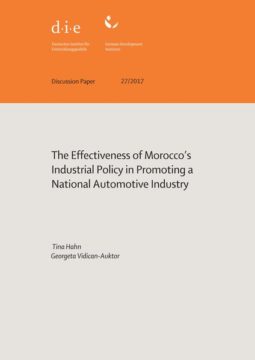Since the 1980s, international production patterns have fundamentally changed, creating opportunities for developing countries to integrate into global value chains (GVCs). Morocco, which is among the first countries in the Middle East and North Africa to pursue an export-led economic policy, has used this opportunity, among others, to develop an automotive supplier industry, which became one of the country’s industrial lead-sectors. This paper analyses how industrial policy and industry-level dynamics contributed to the emergence of an automotive supplier industry. We find that, although Morocco achieved its overall goal of establishing such an industry, this industry remains limited to low-value activities. With the aim of deepening the level of integration into GVCs and acquiring a dynamic competitive advantage in the automotive sector, the nature and objective of industrial policy in Morocco has changed in the past couple of years. Instead of focusing primarily on its labour-cost advantage to attract lead-firms to localise in Morocco, decision-makers currently are taking a more systemic approach to industrial policy, focusing on fostering synergies across sectors, creating ecosystems for different parts of the value chain, and using targeted support measures for enhancing workforce capabilities and competencies. We find evidence for a tendency towards the co-design of policy measures by public and private stakeholders, which, if it persists, could lead the way towards a more effective industrial policy. The main challenge for the future of the automotive sector in Morocco lies in a stronger inclusion of local firms in the value chain and a gradual shift towards higher value added. This will require a stronger focus on developing advanced technological skills and a higher level of investment in research and development.
- Veröffentlicht am Montag 28. Oktober 2024 von Deutsches Institut f. Entwicklungspolitik
- ISBN: 9783960210528
- 54 Seiten
- Genre: Gesellschaft, Politik, Sachbücher, Wirtschaft
